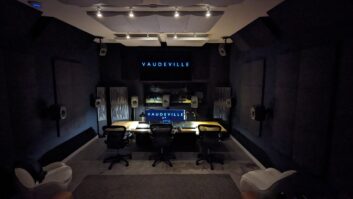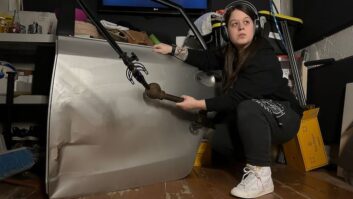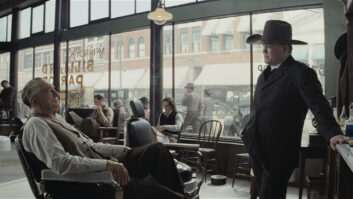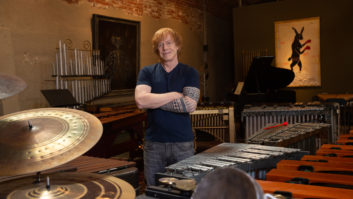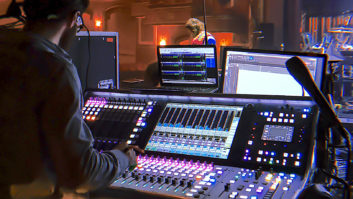One of the best parts of moderating Mix Forums online (www.mixforums.com) is that I get to read and, most of the time, approve all of the messages submitted by site visitors. I like reading your technical questions because they keep me up-to-date about what kind of problems you’re having with gear, techniques, business and a bunch of other topics. I like discussing and arguing issues like analog vs. digital and RIAA vs. everybody, because they tell me where you stand and what’s important to you.
But my absolute favorite part of the gig is reading the “horror stories” you contribute about recording sessions, live shows and, yes, even church services from hell. You’ve told us about pompous producers getting their comeuppance, idiot clients finally (or sometimes never) realizing the error of their ways, and horrendous screwups that you admit to and laugh at now. As the great Steve Allen said, Comedy = Tragedy + Time.
We’ve got well over a hundred horror stories online now, and this month, I thought I’d share a few of my favorites. I’ve changed any identifying characteristics in the stories to protect both the innocent and the guilty, but I haven’t done any serious checking on whether any of them are actually true. After all, as journalists since time immemorial have known, one should never let the facts get in the way of a good story. I’ll just have to take your word for it.
THIS ONE TIME, IN THE STUDIO…
Punch-in, rinse, repeat: Many years ago, I worked with my partner on a project with a famous producer. We only had a few days’ time to record, overdub and mix three songs. Late one night, we were working on punching in a vocal section of a song, and after the first take, I let the tape machine roll a bit further into the song. The producer (who was dozing in the corner of the room) said, “One more time.” So we rolled it back and did it again. Again, he said, “One more time.” We kept going like this for nearly an hour until we realized that “One more time” had been recorded on the tape at the end of the first take. But we kept on hearing it because after each new take, I would punch out right at the end of the vocal. We found out that the guy had actually been asleep for the entire hour we were going over and over the part.
Your highness: It was a 24-track analog mixing session. The producer and the mix engineer were hard at work when the executive producer came in and started to assert his presence by pressing some buttons on the mixing console: mutes and solos. At a certain moment, he pressed Solo on track 24, which was, of course, timecode — and very loud. He looked shocked. “Are you guys using this on the song too?” “Yes, of course,” said the engineer. “Well,” said His Executiveness, “please keep the volume of this track pretty low.”
The human metronome: I accepted a call to track a rock band’s demo late last year. The band set up quickly and seemed on top of things. They wanted to loosen up by going straight to 2-track for a little while. I was asked to set up a single vocal mic, and there was also this one extra fellow who appeared not to play anything but asked for a set of cans.
The female vocalist came in, smiled at me through the glass, adjusted the mic stand, and pretty soon, the band started counting off. I noticed, however, that the vocalist was not wearing headphones, so I hit the talkback and asked her if she wanted cans. The “extra” guy said that I had to speak to her through him. Thinking that I was dealing with an ego here, I said, “Fine, please ask her if she wants cans.” His reply: “It would be no use; she’s stone deaf.”
His role, it turns out, was to conduct her so that she knew when to come in — a human metronome who knew how to sign. You cannot imagine the sounds she created in her role as a “vocalist,” although the “lyrics” were right on meter. The band has a strong local following north of Baltimore, or so they say.
Even the dog cried: A woman booked an hour of time in my studio and showed up on the appointed day with her husband of 25 years. They told me that they were about to redo their marriage vows, and he wanted to sing a particular song to her during the ceremony but was afraid that he might not be able to pull it off, as he might be overcome with the emotion of the moment. So they decided he should record the song, and they would play the tape at the appropriate point.
Made sense to me. I started to copy the background-music cassette they’d brought in over to the multitrack so he could overdub his vocal. The song was, unfortunately, “Wind Beneath My Wings.” Now we all know how difficult that song is to sing for several reasons, not the least of which is that it was written for a woman’s voice and that there are no drums during the whole first half of the tune. I was already starting to get a chill up my spine when she casually mentioned that her husband had never done this sort of thing before. Oops!
Well, I won’t bore you with the gory details of how the session progressed. Suffice to say, my wife took the boys out somewhere in the car, the dog howled at the door until I let him escape, as well, and the cat threw up a hairball right on top of the console. To this day, I will never hear that song again without breaking out into a cold sweat. I hope the ceremony survived the playing of that tape. I plan to be on vacation on their 50th.
Don’t touch that button: Multitrack recording direct to the computer, running Cubase. Band in the studio. Several takes, many hours’ work. Had to eject a floppy that was used a few hours earlier to print a lyric for the band. Floppy-eject button? Nope. PC POWER SWITCH — Thump!! Off it goes!
WHY THEY INVENTED SOUNDCHECK
God, are you there?: Back in the early ’90s, we were hired to do a rock/blues festival at the local music school here in our little town in Mexico. One of the headliners was a group who were all in their mid-40s, and none of them had ever used a monitor system before. We did our soundcheck, and the guitarist was the last one to set up. We asked him to play, which he did with his eyes closed: It seemed he had just smoked some hash before setting up, so he was pretty inspired and getting into a Clapton vibe. After a couple of minutes, I called his name through the monitors: “Luis…Luis…” He started to slow down his playing and opened his eyes and looked around, not knowing what was happening. He closed his eyes again and kept playing. Again I called: “Luis…Luis…” Again, he opened his eyes and this time started to look up toward the sky. Finally, he stopped playing and raised his arms up and said, “God!!” So I answered, “No, you dork, it’s Antonio, and I’m in front of you!”
Stairmaster: I was mixing FOH sound for a college production of Hair, the musical. There wasn’t anyplace in the house that they could put me, so they decided to put me above the house — in the catwalk. Things were a little awkward and a bit cramped up there, with the college’s two 24-channel consoles, the ton-and-a-half of wireless mic receivers, the FX processors and other assorted outboard gear. The power supplies for the consoles were right at knee level under the consoles.
Well, you can guess what happened when I got comfortable during a run-through. I shifted my leg, and all of a sudden, I had no power to the console. I had to run back down to the booth and turn everything off in order, run back up to the catwalk, turn on the power supplies and then run back downstairs to the booth to turn everything back on again. It was not fun, but the rehearsal just kept going as if nothing happened.
It wasn’t until the second time that it happened that I became angry and so did the tech director. But, hey, I got in shape with running around, and I learned a valuable lesson: Never get comfortable while running sound!
What’s that smell?: I had just started working for a band doing FOH sound. It was only the second night of what promised to be a six-year run with these guys, and I was eager to please. It was supposed to be an off night, but we got a call to fill in for another group that had cancelled.
I went to the club, laid out the gear and tied my power into a convenient breaker panel. When I turned on the first monitors, I realized I had nothing! No power. I checked all of the gear; none of it was on, but the six-ways (indicator lights) were all on. And then I started to hear these repeated “pops” and smelled the telltale burning of insulation, plastic, etc.
I rechecked the breaker box and, to my horror, realized it was a three-phase panel, and, yes, I had tapped onto a 240VAC branch. I pulled power just in time to prevent flames from erupting out of the racks. A local country group was gracious enough to bring in their gear from down the street so that we could do the gig, but we never played there again.
Double-check the booking: A friend of mine is in a thrash-metal-meets-percussion-ensemble band: raging bass and double-bass-drum ostinatos over which xylophone, vibes or steel drums play very loudly. The “vocal” portion consists of someone yelling one word on one pitch, sometimes for an entire song. Their whole set is nothing but their own music. Being fairly new to the performing scene, they tend to take any gig that is offered to them. Someone booked them for a party held annually at a local Elks club, most of whose members are retirees and older yuppies with children.
Confused about this and concerned that the Elks club wasn’t going to get the type of music they thought they were going to get, I approached the man who hired them. “Did they give you a demo tape?” I asked. “Yes,” he replied. I paused a bit and then asked, “And you listened to it?” Again, he said, “Yes.” Well I had to know, so I asked, “Why on Earth did you book this band?”
He smiled and explained, “There are eight of us on the board. Every year, the responsibility to hire a band for this event shifts to one of us. This was my first year, and after looking for weeks, I was so frustrated that I finally gave up and hired these guys, because I know they’ll never ask me to do this again!”
EVEN ASSISTANTS GET THE BLUES
Not so helpful help: We were laying album tracks with an extremely well-known band and had successfully completed the second number, getting the basic tracks on to our trusty 3M 16-track. I was terribly efficient, and as soon as I heard the band approve the take after playback, I immediately leadered it up as I had the previous number. I even zeroed the big fluorescent SelecTake digital tape counter so that it was ready for the next song. But then, the producer had a quick word in the engineer’s ear, and he said to me, “We just need to do a quick guitar overdub. Go and put an 87 on the amp and bring it up on 28.” I was off like a shot to move the mic and repatch it.
It only took a short time to do it, but by the time I was back in my seat next to the tape machine, they had changed their minds. “We’ll just go on to the next number,” I was told, so I had to go out and move the mic back to its original position and channel. The band went back into the studio, and being well-rehearsed as people were in those days, they were ready for a take in a little more than 15 minutes.
Not only were they ready, their first take sounded like it was going to be the master. The last chords faded away, and everyone was smiling. But as I turned to stop the machine, I was overcome by sheer horror as I saw a piece of leader tape run past the heads. I had just wiped the previous song! I dutifully admitted my mistake to the engineer, and he was kind enough to give the band some technical reason why they had to do the previous number all over again.
The engineer, it turned out, had done his best to help me get ready for the overdub. While I had been out moving the mic, he had kindly rewound the tape to the beginning of the song. He had even more helpfully re-zeroed the counter for me. Only he didn’t tell me he’d done it — so we had now wiped the basic tracks of what was destined to be the band’s next single. Luckily, we rerecorded the number in a couple of takes. And, luckily, it made the charts.
A regional situation: A couple of years ago, I was the Pro Tools engineer for a composer on a low-budget feature film. As this was my first gig as a Pro Tools engineer, I wanted to do everything perfectly, so I stayed up all night with the composer making sure that everything was set up right, complete with guide tracks, click tracks, etc.
When the clock struck 9 a.m., we rushed to the studio, set up the mics and prepared for the orchestra. Everything went perfectly for the next six hours as the composer conducted all of the cues. Then, around 4 in the afternoon, we finally got to the last music cue of the film. We were running low on hard disk space, and the take we had just recorded was no good, so I used the Delete Selected Regions command in Pro Tools to free up space.
When we went to record the next take, there was suddenly no click track, because I had inadvertently selected the click track to delete when I deleted the last take! It was the most complicated tempo map of the entire film, with meter or tempo changes about every 12 bars. Even after scouring the disk with Norton we couldn’t recover the click, so the orchestra had to wing it with the composer (who is no conductor) waving his arms without benefit of a click.
The session finished three hours late, and we spent three extra days of editing trying get the track to sync to what was supposed to be the right tempo and meter. After all that, it still didn’t sound quite right.
Moral of the story: Never use the Delete Selected Regions command in Pro Tools!
There are plenty more where these came from, and I invite you to come over to mixforums.com, join our merry band and read as many of these as you can stomach. And then add your own.
A tip o’ the “Insider Audio” toupee to Prince Charles Alexander, Richard Elen, Mike Petit, Noel Quinlan and those who wish to remain anonymous.
